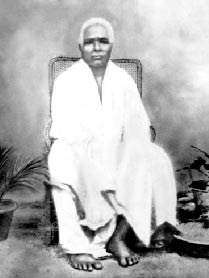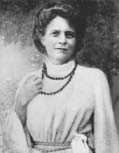The Death of Gopaler Ma by Sister Nivedita from her book Studies from an Eastern Home
Gopaler Ma (left) Sister Nivedita (right)
|
||
INDIAN languages are curiously rich in tender diminutives, the use of which so much depends on association that they are incapable of translation. It is clear, for instance, that if we address a little girl of three as Ma, or a boy of the same age as Bap, that delicate mingling of gravity and laughter which we intend to convey is a matter entirely of the colour of the voice, and will defy any attempt to render it in a foreign tongue. One of the most striking words of this class is Gopala. Literally, it means the Cowherd, referring to Krishna--the Krishna of Brindaban. But it has been so appropriated in this regard that its actual significance can only be rendered in English as "Christ-Child," and the woman who folds her baby-boy closer, calling him Gopala, is paralleled amongst English mothers only by one who thinks of her child as the Christ-Child, come to her out of night and storm seeking to find His Own. In this sense the name is often on the lips of all our household. For in one of the rooms of our zenana lives an old old woman, who is known as Gopaler-Ma, the Christ-Child's Mother. . . . . . . . . All night long we had been watching the slow hard breathing of the dying. In, in, in, it would go, growing ever more and more still, till one thought that never again could any movement occur in the aged frame, and then freedom once more and a succession of quick deep inbreathings. Such breathing, they said, was seen but seldom, and was the result of long years of Pranayama, practised unconsciously over the beads, as night and day the old woman had counted them, saying the name of her Ishtam, "Gopala, Gopala, Gopala!" For she beside whom we sat and watched was Gopaler-Ma, that saint whom Sri Ramakrishna himself had treated as his mother. Without a single want she lay there, as she had lived, the mind suspended in the thought that had made its life, the face full of the last sweetness and peace. A day and a night already had she lain thus by the Ganges side. For at the moment of the rising of the full moon, we had stepped with her over the threshold of the door, and had felt the silent soaring of her spirit, as it cast off triumphantly the first of its outer wrappings, the shell of home. But when she had reached the ghâts, and lain awhile in the play of cool breezes and the brightness of the moon, she had shown, as the dying are wont to do, some signs of revival. And the candle of life for many an hour thereafter had burnt up in its worn socket, before it was finally to be put out. It was not, perhaps, entire unconsciousness in which she lay. For to one and another it would seem, now and again, as if she gave a look of recognition, following them with her eyes. And on that last morning, when a Brahmin came and chanted above her slokas from the Upanishads, she had responded visibly, with what would almost represent excitement. All her life long she had worshipped the idea of the Holy Child, and now there seemed a fitness in the fact that at the last, dying of old age at over ninety years, the worn-out frame had gone back to babyhood again, and the twitching of the limbs or the turning of the head was the only sign of volition she could give. But even this had been sometime past, for now that night was with us once again, she had lain still for many hours, with all the consciousness turned inward, and the peace of one who asked nothing of the world about her. We, the waiting women, could hear from without the long low lapping of the Ganges against the foot of the bathing-stairs, and the moaning whisper of the rain-winds as now and again they swept down and caught the surface of the waters. And once, was it at midnight, or was it an hour or so later?--once in the midst of the silence there came a rushing and swirling of the river beneath the cloud-veiled moon, and the little boats lying at anchor on the Ganges knocked against each other, and the word went round, "The tide is coming in!" But some, to whom the passing soul had been friend and Guru, sighed, for with the turn of that tide had we not been warned that she would go forth, and her place and people know her no more? Hour upon hour had gone and still no change. Some who had rested rose, and plied little offices of tenderness beside the sick, and another lay down to snatch a spell of sleep. Suddenly there was a stir, and a light hand touched the sleeper. "Call the bearers," said one, "for the end is come!" Out on the terrace above the river-steps they sat, as they had sat all night, holding deep talk of the past, and of the Lives with which this life outgoing here had been a link, and easy enough were they to call. A moment more and the dying form was lifted to the cot, and then, on the shoulders of yellow and white clad bearers together, it was borne swiftly out of the room to the north, and then down the few steps that it needed to take Gopaler-Ma where she could lie with feet touching the sacred waters, and so go forth. There she lay, the last changed breaths coming at easy intervals, while one of the monks, whom she had known as boys, bent over her and with his brow to hers, half spoke, half whispered the words that the Hindu loves to hear in his last hour--Om Ganga Narayana! Om Ganga Narayana Brahma! A moment more, and then with one voice from the circle of watchers came the shout of Haribol! for the last breath had gone. The spirit of Gopaler-Ma had taken flight, and only the garment of flesh was left behind. Then one at the head of the bier, looking up at the brightening of the sky behind the clouds asked, "Is this the dawn?" And from the foot came back the answer, "Yes it is the dawn!" And then, looking down, we saw that the waters that had bathed the feet of the dying were already receding--were already sunken some inches below us. Gopaler-Ma had died indeed at the moment of dawn, on the very turn of the outgoing tide.
|
- www.vivekananda.net edited by Frank Parlato Jr.

